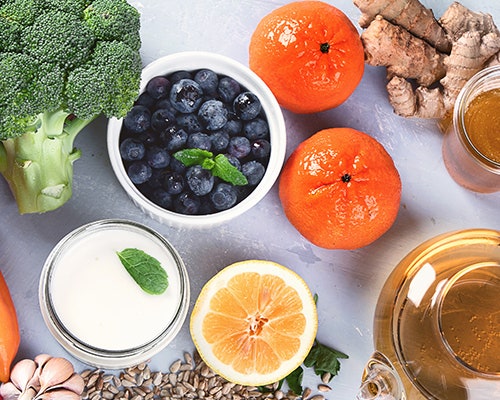A Bowl of Cherries: Health Benefits
- 8/22/16

It’s no secret that fresh fruits can deliciously offer many health benefits—and cherries are among them. They’re yummy, radiantly red, providing antioxidants, some important vitamins and minerals—and they’re outstandingly good for you! Truth be told, cherries provide an array of benefits in everything from supporting healthy inflammation levels to supporting a healthy weight.
There are a variety of types of cherries available, but fresh, unsweetened cherries are low-calorie, pigment-rich fruits. Cherries get their color from anthocyanins, the red, purple or blue pigments found in many fruits and veggies that are concentrated in their skins and packed with antioxidants. Among other benefits, studies say that cherries’ anthocyanins act as anti-inflammatory agents to help keep joints and muscles healthy.
Bing cherries, in particular, have the ability to reduce uric acid, which is known to cause painful inflammation in those who experience arthritis. Eating two cups of Bing cherries daily can actually reduce uric acid levels in the body by up to 15 percent. Cherries can also naturally reduce C-reactive protein (CRP) levels in the body. Excessive CRP levels—which signal excessive, unhealthy inflammation—have been implicated in everything from cardiovascular disease to arthritis.
Additionally, cherries’ antioxidants appear to keep cells, nerves, insulin levels and the cardiovascular system healthy, while supporting healthy aging—according to some studies.
Cherries are also sources of melatonin, the hormone that helps regulate sleep, which can cross the blood-brain barrier to produce positive effects on neurons and the nervous system to help promote relief from headaches as well as insomnia. Also serving as mild sources of zinc, moderate sources of iron, potassium, calcium and magnesium, cherries help with healthy body fluid regulation as well as heart rate and blood pressure balance.
As a matter of fact, one cup of cherries has as much potassium as a banana does—and potassium is essential for keeping blood pressure in check and for proper sodium and potassium levels in the body.
Likewise, cherries provide good amounts of fiber—nearly three grams per one-cup serving. Fiber, of course, helps you feel full, reducing the urge to overeat. And since fiber isn’t absorbed by the body, you accumulate fewer calories per serving. One cup of cherries, by the way, has only about 100 nutrition-packed calories.
Cherries are also high in the B vitamins and vitamins C and A. Those B vitamins, including thiamine, riboflavin and vitamin B6, are necessary for proper metabolism and converting nutrients into useable bodily energy. While all cherries contain vitamins C and A, acerola or West Indian cherries are particularly high in vitamin C (nearly 1,678mg per 100g) and in vitamin A (767IU per 100g).
So, go ahead and make your life—and possibly your health—"a bowl of cherries" by eating a bowl of cherries and a variety of other fruits regularly.
There are a variety of types of cherries available, but fresh, unsweetened cherries are low-calorie, pigment-rich fruits. Cherries get their color from anthocyanins, the red, purple or blue pigments found in many fruits and veggies that are concentrated in their skins and packed with antioxidants. Among other benefits, studies say that cherries’ anthocyanins act as anti-inflammatory agents to help keep joints and muscles healthy.
Bing cherries, in particular, have the ability to reduce uric acid, which is known to cause painful inflammation in those who experience arthritis. Eating two cups of Bing cherries daily can actually reduce uric acid levels in the body by up to 15 percent. Cherries can also naturally reduce C-reactive protein (CRP) levels in the body. Excessive CRP levels—which signal excessive, unhealthy inflammation—have been implicated in everything from cardiovascular disease to arthritis.
Additionally, cherries’ antioxidants appear to keep cells, nerves, insulin levels and the cardiovascular system healthy, while supporting healthy aging—according to some studies.
Cherries are also sources of melatonin, the hormone that helps regulate sleep, which can cross the blood-brain barrier to produce positive effects on neurons and the nervous system to help promote relief from headaches as well as insomnia. Also serving as mild sources of zinc, moderate sources of iron, potassium, calcium and magnesium, cherries help with healthy body fluid regulation as well as heart rate and blood pressure balance.
As a matter of fact, one cup of cherries has as much potassium as a banana does—and potassium is essential for keeping blood pressure in check and for proper sodium and potassium levels in the body.
Likewise, cherries provide good amounts of fiber—nearly three grams per one-cup serving. Fiber, of course, helps you feel full, reducing the urge to overeat. And since fiber isn’t absorbed by the body, you accumulate fewer calories per serving. One cup of cherries, by the way, has only about 100 nutrition-packed calories.
Cherries are also high in the B vitamins and vitamins C and A. Those B vitamins, including thiamine, riboflavin and vitamin B6, are necessary for proper metabolism and converting nutrients into useable bodily energy. While all cherries contain vitamins C and A, acerola or West Indian cherries are particularly high in vitamin C (nearly 1,678mg per 100g) and in vitamin A (767IU per 100g).
So, go ahead and make your life—and possibly your health—"a bowl of cherries" by eating a bowl of cherries and a variety of other fruits regularly.




